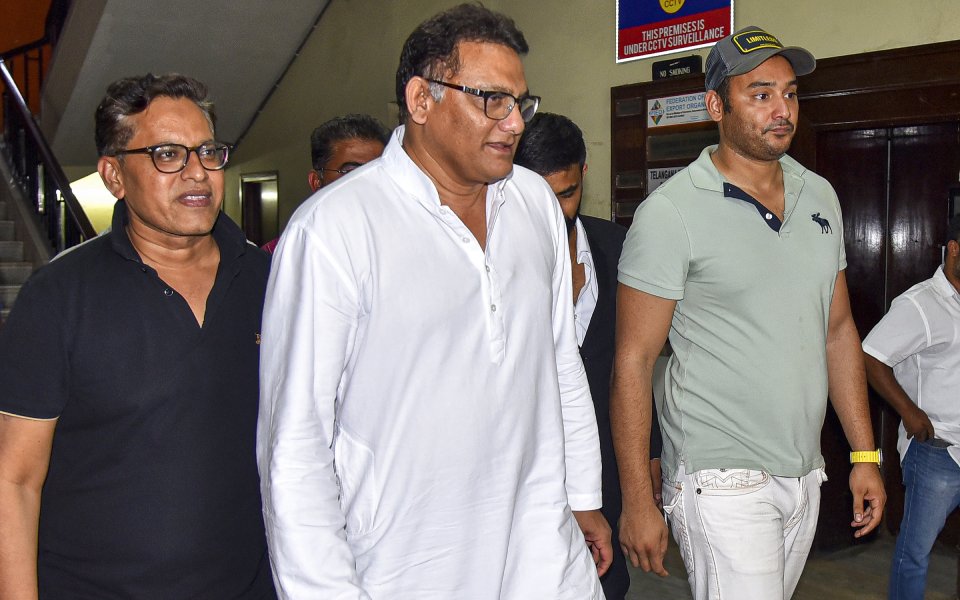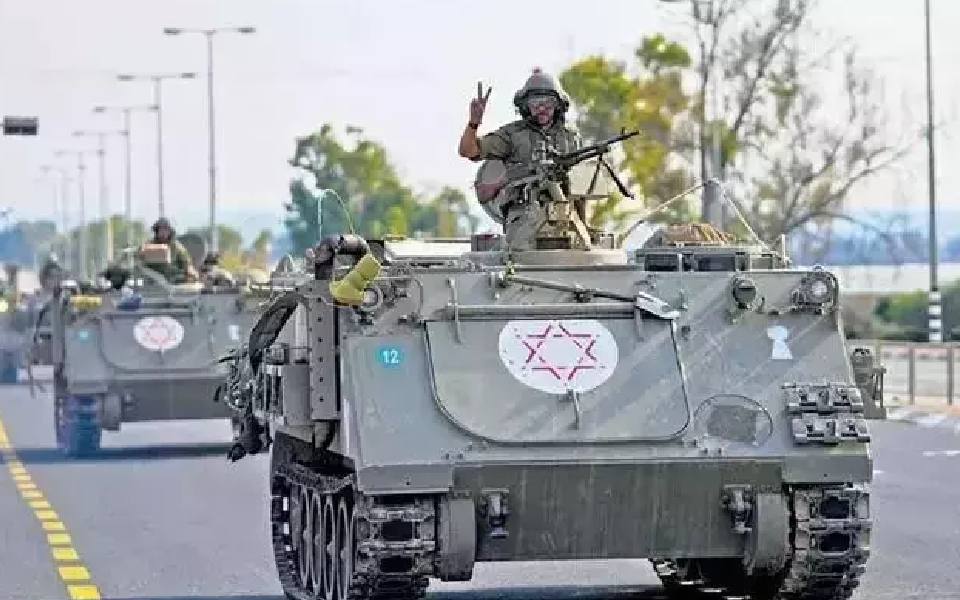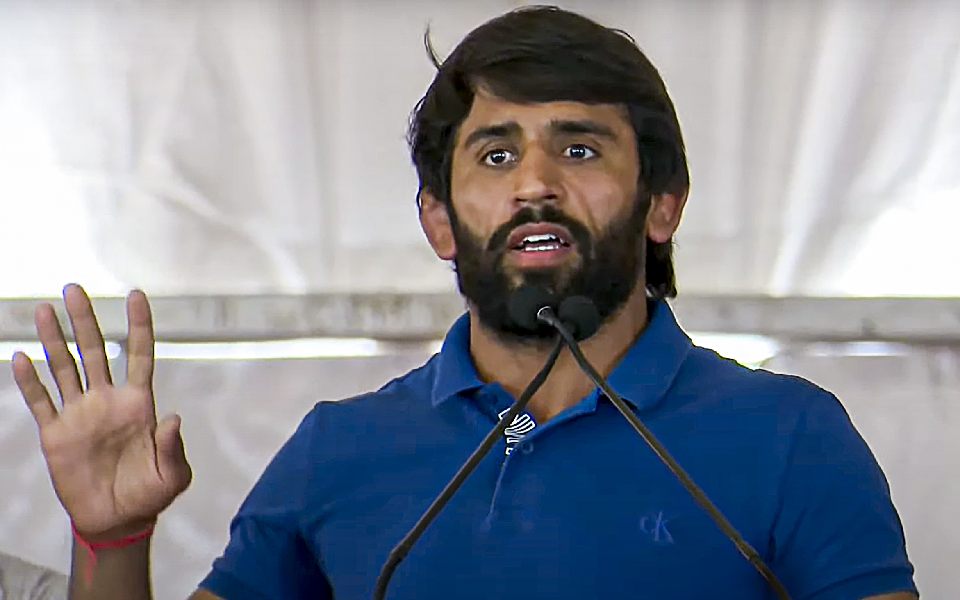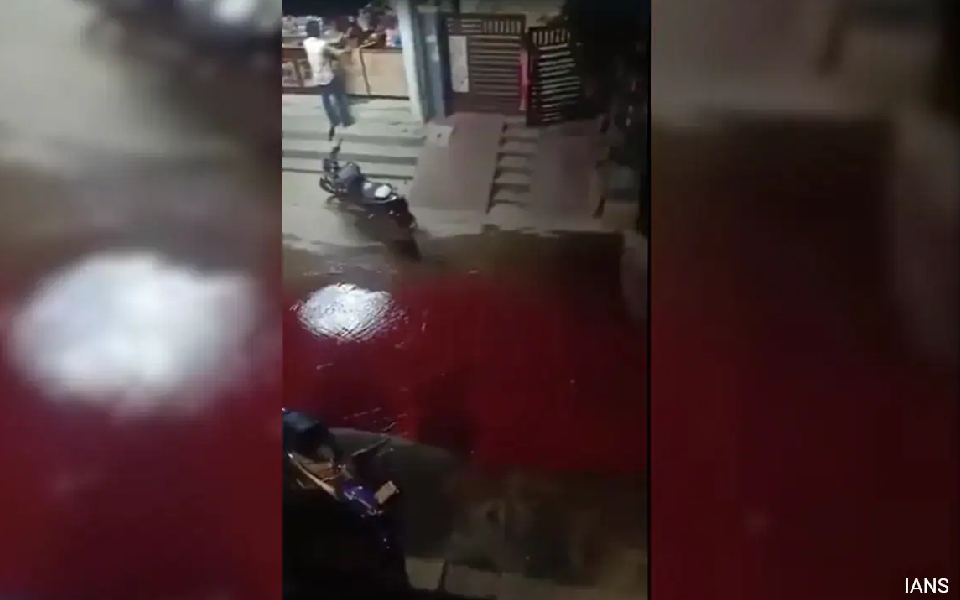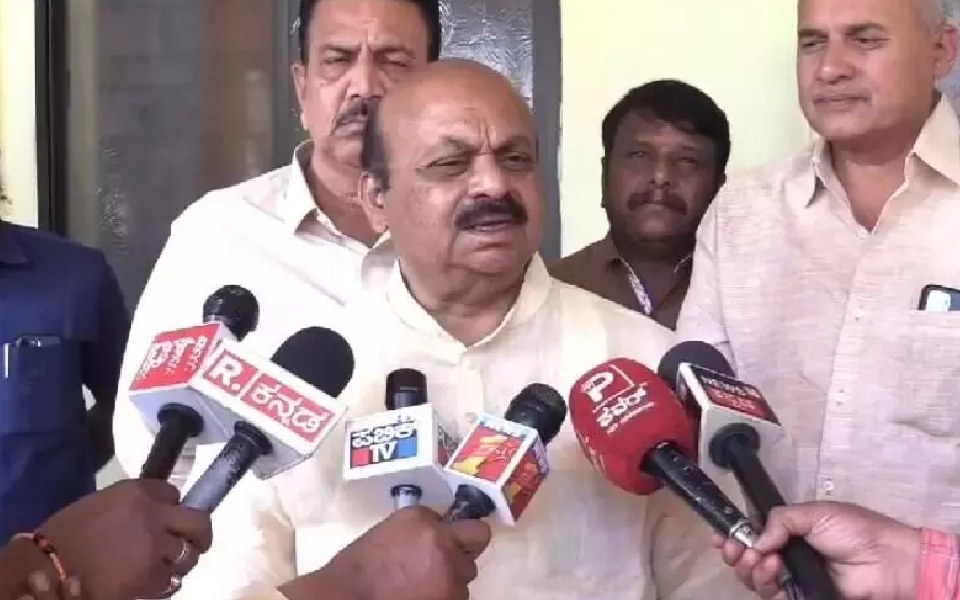Hyderabad, Oct 8: The Enforcement Directorate on Tuesday questioned former Indian cricket team captain and Congress leader Mohammed Azharuddin for over nine hours in a money laundering case linked to alleged financial irregularities in the Hyderabad Cricket Association, official sources said.
The federal agency recorded his statement under the Prevention of Money Laundering Act (PMLA), they said.
The 61-year-old former MP was first asked to depose before the ED on October 3 but he sought deferment of the notice and asked for a fresh date. The agency subsequently issued him fresh summons to appear on October 8.
Dressed in a white kurta-pyjama, Azharuddin reached the ED office on Fateh Maidan Road around 11 am. He left the ED office after 9 pm.
He told reporters while exiting that he was "cooperating" with the investigation.
"All the allegations which have been made were baseless, frivolous and done with a malafide intention. Beyond that I have nothing more to say. I don't want to go into the details...," he said.
The probe is related to alleged financial irregularities in the Hyderabad Cricket Association (HCA). The ED had conducted searches in connection with the irregularities in November last year.
Azharuddin's role during his tenure as the HCA president is under the scanner of the agency, the sources had said.
The former Indian skipper had unsuccessfully contested the Telangana Assembly polls held last year.
Following the registration of a case in connection with the alleged irregularities by the Telangana Police last year, he had said that the allegations levelled against him were "false" and "motivated" and it was "just a stunt" pulled by his rivals to ruin his reputation.
The money laundering case stems from three FIRs and charge sheets filed by the Telangana Anti-Corruption Bureau (ACB) in connection with alleged criminal misappropriation of funds of the HCA to the tune of Rs 20 crore.
One such police FIR was registered on the complaint of the HCA Chief Executive Officer Suneel Kante Bose after a forensic audit (interim report) found that certain transactions done on behalf of the HCA with third-party vendors were found to be "not genuine" and that the transactions were carried out in a manner "detrimental" to the interest of the association.
The police charge sheets contain "allegations of serious irregularities in the procurement of DG sets, firefighting systems and canopies for the Rajiv Gandhi Cricket Stadium constructed in Uppal, Hyderabad," the ED had earlier said in a statement.
According to the charge sheets, despite deadlines, several works were delayed inordinately, leading to escalated costs and budget enhancements and corresponding losses to the HCA.
It was found that the office bearers of the HCA, including its then secretary, president and vice-president and others, in collusion with private parties, "arbitrarily" got various tenders and works allotted to preferred vendors/contractors at higher than market rates without following proper tender processes and in many cases even before the receipt of quotations, the agency had alleged.
Advance payments were made to many contractors but no work was done by them, it added.
The ED had raided the premises of former office bearers of the HCA, including former vice president and cricketer Shivlal Yadav, Congress MLA and ex-HCA president Gaddam Vinod, former HCA secretary Arshad Ayub apart from the office of a company called S S Consultants Pvt. Ltd. and the residential premises of its managing director Satyanarayana.
The ED had said its raids undertaken last year led to the seizure of digital devices, "incriminating" documents and "unaccounted" cash of Rs 10.39 lakh.
One of the observations made in the forensic report was that "Mohammad Azharuddin, the then President of the Association in the 9th Apex Council meeting held on March 3, 2021 had sought to take up discussions regarding firefighting equipment. However, subsequently without assigning any reasons, the tender was not allotted to any of the bidders. Thereafter, the HCA had floated a second tender for the same work." Azharuddin is a Padma Shri and Arjuna Award recipient. He began his political innings with a win from Uttar Pradesh's Moradabad Lok Sabha seat in 2009. He is also a working president of the Telangana Pradesh Congress Committee (TPCC).
Let the Truth be known. If you read VB and like VB, please be a VB Supporter and Help us deliver the Truth to one and all.
Beirut, Nov 26: Israeli Prime Minister Benjamin Netanyahu said Tuesday that he would recommend his cabinet adopt a United States-brokered ceasefire agreement with Lebanon's Hezbollah, as Israeli warplanes struck across Lebanon, killing at least 23 people.
The Israeli military also issued a flurry of evacuation warnings — a sign it was aiming to inflict punishment on Hezbollah down to the final moments before any ceasefire takes hold. For the first time in the conflict, Israeli ground troops reached parts of Lebanon's Litani River, a focal point of the emerging deal.
In a televised statement, Netanyahu said he would present the ceasefire to Cabinet ministers later on Tuesday, setting the stage for an end to nearly 14 months of fighting.
Netanyahu said the vote was expected later Tuesday. It was not immediately clear when the ceasefire would go into effect, and the exact terms of the deal were not released. The deal does not affect Israel's war against Hamas in Gaza, which shows no signs of ending.
The evacuation warnings covered many areas, including parts of Beirut that previously have not been targeted. The warnings, coupled with fear that Israel was ratcheting up attacks before a ceasefire, sent residents fleeing. Traffic was gridlocked, and some cars had mattresses tied to them. Dozens of people, some wearing their pajamas, gathered in a central square, huddling under blankets or standing around fires as Israeli drones buzzed loudly overhead.
Hezbollah, meanwhile, kept up its rocket fire, triggering air raid sirens across northern Israel.
Lebanese officials have said Hezbollah also supports the deal. If approved by all sides, the deal would be a major step toward ending the Israel-Hezbollah war that has inflamed tensions across the region and raised fears of an even wider conflict between Israel and Hezbollah's patron, Iran.
The deal calls for a two-month initial halt in fighting and would require Hezbollah to end its armed presence in a broad swath of southern Lebanon, while Israeli troops would return to their side of the border. Thousands of Lebanese troops and UN peacekeepers would deploy in the south, and an international panel headed by the United States would monitor all sides' compliance.
But implementation remains a major question mark. Israel has demanded the right to act should Hezbollah violate its obligations. Lebanese officials have rejected writing that into the proposal. Israel's Defense Minister Israel Katz insisted on Tuesday that the military would strike Hezbollah if the U.N. peacekeeping force, known as UNIFIL, doesn't provide “effective enforcement” of the deal.
“If you don't act, we will act, and with great force,” Katz said, speaking with UN special envoy Jeanine Hennis-Plasschaert.
The European Union's top diplomat, Josep Borrell, said Tuesday that Israel's security concerns had been addressed in the deal also brokered by France.
“There is not an excuse for not implementing a ceasefire. Otherwise, Lebanon will fall apart,” Borrell told reporters in Italy on the sidelines of a Group of Seven meeting. He said France would participate on the ceasefire implementation committee at Lebanon's request.
Bombardment of Beirut's southern suburbs continues
Even as Israeli, US, Lebanese and international officials have expressed growing optimism over a ceasefire, Israel has continued its campaign in Lebanon, which it says aims to cripple Hezbollah's military capabilities.
An Israeli strike on Tuesday levelled a residential building in the central Beirut district of Basta — the second time in recent days warplanes have hit the crowded area near the city's downtown. At least seven people were killed and 37 wounded, according to Lebanon's Health Ministry.
Three people were killed in a separate strike in Beirut and three in a strike on a Palestinian refugee camp in southern Lebanon. Lebanese state media said another 10 people were killed in the eastern Baalbek province. Israel says it targets Hezbollah fighters and their infrastructure.
Earlier, Israeli jets struck at least six buildings in Beirut's southern suburbs. One strike slammed near the country's only airport, sending plumes of smoke into the sky. The airport has continued to function despite its location on the Mediterranean coast next to the densely populated suburbs where many of Hezbollah's operations are based.
Israeli military spokesman Avichay Adraee issued evacuation warnings for 20 buildings in the suburbs, as well as a warning for the southern town of Naqoura where UNIFIL is headquartered.
UNIFIL spokesperson Andrea Tenenti told The Associated Press that peacekeepers will not evacuate.
Other strikes hit in the southern city of Tyre, where the Israeli military said it killed a local Hezbollah commander.
The Israeli military also said its ground troops clashed with Hezbollah forces and destroyed rocket launchers in the Slouqi area on the eastern end of the Litani River, a few kilometres from the Israeli border.
Previous ceasefire hopes were dashed
Under the ceasefire deal, Hezbollah would be required to move its forces north of the Litani, which in some places is about 30 kilometers (20 miles) north of the border.
A ceasefire between Israel and Hezbollah, the strongest Iranian-backed force in the region, would likely significantly calm regional tensions that have led to fears of a direct, all-out war between Israel and Iran. It's not clear how the ceasefire will affect the Israel-Hamas war in Gaza. Hezbollah had long insisted that it would not agree to a ceasefire until the war in Gaza ends, but it dropped that condition.
Hezbollah began firing into northern Israel, saying it was showing support for the Palestinians, a day after Hamas carried out its Oct. 7, 2023, attack on southern Israel, triggering the Gaza war. Israel returned fire on Hezbollah, and the two sides have been exchanging barrages ever since.
Israel escalated its campaign of bombardment in mid-September and later sent troops into Lebanon, vowing to put an end to Hezbollah fire so tens of thousands of evacuated Israelis could return to their homes.
More than 3,760 people have been killed by Israeli fire in Lebanon the past 13 months, many of them civilians, according to Lebanese health officials. The bombardment has driven 1.2 million people from their homes. Israel says it has killed more than 2,000 Hezbollah members.
Hezbollah fire has forced some 50,000 Israelis to evacuate in the country's north, and its rockets have reached as far south in Israel as Tel Aviv. At least 75 people have been killed, more than half of them civilians. More than 50 Israeli soldiers have died in the ground offensive in Lebanon.
After previous hopes for a ceasefire were dashed, U.S. officials cautioned that negotiations were not yet complete and noted there could be last-minute hitches that delay or destroy an agreement.
“Nothing is done until everything is done,” White House national security spokesman John Kirby said.
While the ceasefire proposal is expected to be approved if Netanyahu brings it to a vote in his security Cabinet, one hard-line member, National Security Minister Itamar Ben-Gvir, said he would oppose it. He said on X that a deal with Lebanon would be a “big mistake” and a “missed historic opportunity to eradicate Hezbollah.”

